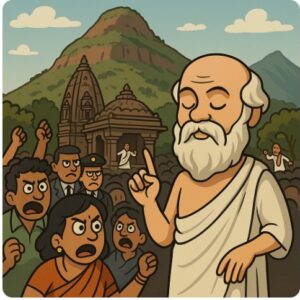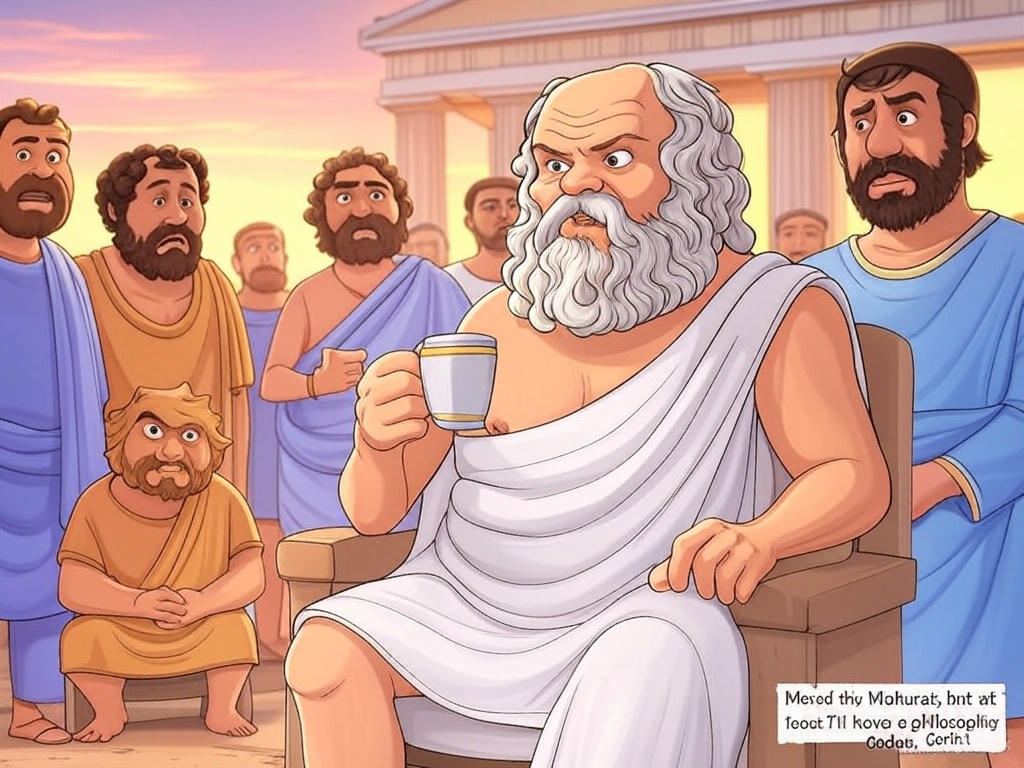
- A chilly Pune morning turns chaotic when a phone call about the Grand Kuber Muhurat—a divine deadline for riches—sends me and my overzealous friend P.cat on a frantic hunt for the elusive Kuber Temple. Racing through Pune’s potholed streets, we dodge line-cutters, survive a stampede, and fall into the wrong cave, uncovering a twist that’s equal parts absurd and divine. Did we miss our fortune, or find something better? Dive into this hilarious, whirlwind chase where timing, greed, and a misplaced bronze plate decide our fate. The next Muhurat awaits!
I have heard of the great California Gold Rush, it is said that many people did get some Gold back then,
A few years back, in the sleepy city of Pune, there was a similar Rush, a Gold and Fortune Rush, however true to 21st century futurism, rather than being an actual Gold Rush, this was a Future and Options Gold Rush !!
Chapter 01: The Begining
It was one of those brutally cold winter mornings, the kind where you wake up, lie there for a while, then slip back into your bed and drift off again. Half-asleep, the dreams feel so much more vivid, maybe because it’s 10 a.m. and the soft, diffused light in the room makes everything seem more alive. And for some inexplicable reason, I had control over the events in my dreams. There I was, standing at the foot of the Himalayas, planning an epic trek to the summit, thinking about how to conquer the heights with no ropes or safety gear—just like in Point Break.

Point Break, 1991 Movie, Remade in 2015
Sadly, my dream adventure was cut short by the all-too-familiar sound of my phone ringing. I’d forgotten to silence it, and that annoying ‘tring tring’ shattered my moment of mountaineering glory.
Groggy and still half in a dreamlike state, I lazily answered the call with a drawn-out, “Hello…”
On a scale of excitement from one to a hundred, I was at a solid negative 10, while the caller on the other end seemed to be at a full-on positive 110. With an enthusiasm that could wake the dead, he shouted, “Did you read today’s newspaper?”
His loud voice startled me enough to pry my eyes open, and I glanced at the phone to see who was calling—it was ‘P.cat.’ (Not the time to question why my contact list looks like a collection of nicknames rather than real names.) I put the call on speaker, trying to muster some enthusiasm to match his, but only managed a weak, “Yes…”
I had more to say, but the simple word drained most of my remaining energy, and I ended up sounding like I was trying to summon a faint pulse of life. On the other end, my caller didn’t miss a beat. He immediately snapped, “Then why did you not tell me?”—as if I’d committed some grave sin by not keeping him in the loop.
Naturally, his question was grammatically off, but since my own grasp of grammar isn’t exactly stellar, I wasn’t about to call him out on it. Still, his reaction felt over the top. A typical newspaper’s — fourteen pages or so, each crammed with five big articles, five little blurbs, and at least four ads. Then toss in the astrology bit, comics, TV and movie listings, some Page 3 glamour shots, and whatever else they can squeeze in. Out of this avalanche of words and pictures, what exactly was I supposed to zero in on, process, and think, “Oh, P.cat needs to hear about this”?
But in my foggy, half-asleep slump, I didn’t have the juice to unload that rant. Instead, I sank back to my negative-10 energy level and mumbled, “What?”
His excitement, meanwhile, was spiking like a thermometer over a roaring fire. He cranked up the volume—pointlessly loud—and my phone’s speaker maxed out as he bellowed, “In today’s paper, it says today’s the Grand Kuber Muhurat!”
Again, some pointless grammar! However, the key word here in ‘Muhurat.’
Muhurats in India are like those “days” in the West—Valentine’s, Father’s, Mother’s, you name it. They’ve got cultural and astrological roots, some history too, but these days, they’re mostly a commercial gimmick to juice up sales. A muhurat for everything, right? Ignoring the redundant “today’s” in his outburst, I wanted to hit him with the full who-what-when-why-how rundown. But here’s the thing: in India, slap “Muhurat” on anything, and it comes with an emotional baggage—touchy, easily bruised feelings. Even in my groggy haze, that cultural wiring kicked in, so I kept it polite and said, “I didn’t read the paper properly, must’ve missed it.”

Undeterred, this hyper-charged guy launched into a full breakdown of the Grand Kuber Muhurat’s significance. Apparently, he’d gotten a text—(from whom is unknown) —claiming that in today’s paper – (which one? no clue) – an article said that anyone praying at a Kuber Temple before 8:30 p.m. would be drowning in wealth and riches. Why? Because—surprise—it’s the Grand Kuber Muhurat.
He’d blasted that text to at least a dozen people, but I got the VIP treatment: a personal call. Not out of generosity, mind you—he wasn’t sharing the wealth vibe. No, he’d hit a snag and needed me to solve it. His big question: “Where’s the nearest Kuber Temple?”
My brain buzzed with a dozen follow-ups, but that ingrained politeness held me back. Keeping my cool, I just said, “No, I don’t know.”
“Then ask someone around,” he shot back.
I blinked awake, scanned my room—empty. Stumbled out, checked the house—deserted. It was 10:30 a.m.; everyone had bolted for work. I stepped outside; the neighbor’s door was locked. Was I the last soul in the building? I had no time to get philosophical here, plus chances that I am in a survival movie are slim, as Pcat is still on the line and no mention of Zombies yet!
Down the stairs I went, looking like a mess—old shorts, ratty tee, barefoot, hair a chaotic compass. Then, salvation: a figure trudging up the steps. I knew him well enough to unload my quest. “Hey, any idea where a Kuber Temple is around here?”

Humans, huh? Thinking creatures, driven by curiosity—the bedrock of progress. This guy was proof of that. He didn’t just answer; he probed. “Why do you need to know?” So I spilled the saga, starting with “I got a call.” I laid out the whole deal, with P.cat still yammering on speaker, chiming in to correct me whenever I veered off-script. The stair-climber soaked it all in, fully briefed, and then delivered his verdict: “No, I don’t know where the nearest temple is.” But before he peeled off, he added, “If you find one, let me know—I’ll tag along.”
I’d bet my last rupee he kicked off his own text chain as he climbed away, phone already out, thumbs flying.
turned to P.cat on the speaker and said, “Alright, I’ll get ready, take a bath, and then we’ll figure this out.”
Back into my den I shuffled, flopping onto the bed. For a few minutes, I just lay there, soaking in the laziness, before dragging myself up with all the enthusiasm of a sloth on sedatives. A bath it was, then. Why the rush? Simple: P.cat lived close, and I knew his patience was thinner than a razor’s edge. I could practically see him twitching, his restlessness overriding any shred of chill, and I figured there was a solid chance he’d show up at my door any minute.
It took me a leisurely hour and a half to get my act together. By the time I sat down for breakfast, noon had rolled around. I glanced at my phone—five messages from five different people, all buzzing about the Muhurat. Mid-bite, another five calls rolled in, parroting the same news. This thing had sunk its claws into Pune, spreading like wildfire—or, yeah, maybe a mushroom cloud after a nuke. (Analogy on point or off the rails? You decide.)
Sure enough, as predicted, the hyper-excited chap turned up, practically hyperventilating on my doorstep. I swung the door open, and his first words hit me like a freight train: “Did you find where the temple is?”
Chapter 02: Temple Run
Normally, a hype like this would’ve fizzled out fast, but this one had all the makings of a killer marketing campaign. A ticking clock—offer expires at 8:30 p.m. tonight! Divine cred with Kuber, the wealth god himself! And a pitch straight to the soul’s lazy dream: spiritual glow-up (aka piles of cash, no effort required!). Years later, pop culture would slap a label on this madness—“going viral.”
P.cat, of course, didn’t bother asking if I was in. Nope, he just roped me into his treasure hunt like I’d signed up for it. Off we went, zipping through Pune on his bike, its 11.3BHP engine roaring like he was some knight on a quest. We bounced from one acquaintance to the next, starting each stop with a casual, “Hey, know where a Kuber Temple is?” Then he’d launch into the full Muhurat spiel. Some folks offered tea, others tossed us snacks—chakli, whatever—but every chat ended the same: “No idea where that temple is.” with the addition of “If you find one, let me know—I’ll tag along.”
I wasn’t complaining too much; the free food recharges kept me going. Still, as we weaved through Pune’s dunes, dodging potholes and skirting dug-up drainage lines, I couldn’t help but wonder—why burn all this fuel when a phone call could’ve done the trick? But my rider, my Sarathi, was past reason, hell-bent on digging up that temple’s address like it was buried gold.

Each loop—travel, chat, munch—ate up about half an hour. By 5 p.m., we’d hit every corner of the city, or so it felt. P.cat was starting to wilt under the pressure, hope draining out of him like air from a punctured tire. And when hope’s gone, what’s left? A pit stop at S.P. Canteen for samosa pav and a cool kokam or lime juice.
Now, S.P. Canteen isn’t the official canteen of S.P. College, Pune—don’t get it twisted. The real “College Canteen” sits inside the campus, complete with a proper nameplate, no S or P in sight. S.P. Canteen, the one with the letters loud and proud, is 100 meters outside the entrance. Yet, it’s the hotspot for college kids scarfing snacks. Why mention this? Partly because I’m rambling, partly because the samosa and juice at College Canteen just don’t hit the same as one at the Canteen oustide. And Samosa Pav comes with unlimited chutney and mirchi. Trust me, it matters. For those who cannot relate, it’s like having sukkha puri after Pani Puri!
after my entirely unnecessary digression, let’s get back to our treasure hunt, we rolled up to our final refuge—S.P. Canteen—and climbed off the bike. Right then, my brain locked onto a critical dilemma: samosa pav with kokam, or just a lime juice? Life-or-death stuff. As we approached, I spotted a familiar face at the counter, ordering—yep—kokam. I blurted out, “What are you doing here!”
That exclamation mark wasn’t for show. This guy lived miles away, in the distant land of Aundh. If you’re not from Pune, here’s the deal: Aundh is Pune’s version of “beyond the wall.” It’s past Pune University, past the infamous Pune University chowk—a sprawling, chaotic intersection that could trap you for a solid 15 minutes if you timed it wrong. Back then, it was a mess; now they’ve slapped a flyover on it, which somehow made it worse. Latest Update, in 2022 they demolished the flyover and are having another go at the puzzle. However, as a rule, You didn’t cross that chowk unless it was a matter of survival. (For the uninitiated, a “chowk” is what the rest of the world calls an intersection—traffic lights, cars, people, the occasional stray dog, the works.) So seeing this guy, hailing from the outer reaches, casually standing there? Shocking.
His answer “Kuber Muhurat.”
Oh! We weren’t lone rangers after all—reinforcements had arrived. But here’s the kicker: unlike us, this Aundh wanderer actually knew where the temple was. He added, “I figured I’d grab something to eat before heading there.”
P.cat ditched me in a heartbeat, zeroing in on the new guy like a hawk. Time for some intel extraction—sweet talk as the opener, sweet lime juice as backup if needed. Turns out, the temple perched atop a mountain. Well, “mountain” is generous these days; the cement jungle’s crept up and nearly swallowed it whole. Still, technically, it’s a mountain. And not just any mountain-top temple—this was the mountain-top temple of Pune, the one everyone knows: Parvati. (Not the Goddess, wife of of Shiva Paa-ra-va-ti, but Pa-Ra-Va-ti. These are the instances when the flabiness of the English language gets exposed)
Chapter 3: My Meandering March to Destination
An outsider had swooped in and snatched the crown right off our heads. Humiliation doesn’t even cover it—the Punekar in me was downright mortified. How could this Aundh interloper know more about my own city than I did? In a fit of self-inflicted penance, I swore off the samosa. No greasy comfort for this failure.
He went on, laying out the treasure map: Parvati Temple, in all its divine chaos, apparently had a little nook for Lord Kuber—a platform and a mini-temple tucked away. You breeze past the main shrine, slip out the back exit, and there’s a sneaky staircase dropping you right to it. Indian temples are never just one-trick ponies. Sure, the name might spotlight one deity, but they’re all about inclusivity. The main hall’s a gallery—dozens of photos, murals, a whole pantheon staring back at you. Then, outside, you’ve got a constellation of smaller temples, platforms, and statues, each nodding to a different god. Convenience, maybe—knock out all your prayers in one trip—or spiritual, if you buy into the mash-up of vibes and values. Parvati’s no different, a bustling hub of holy real estate.
As he traced the golden path, a spark flickered in my brain, dragging up some old, dusty memories. Way back, just after my 12th Boards, I was a proud member of Phoenix FC—tagline: “If you see a shot, just goal it!” We trained on the Shahu College grounds, nicknamed the “ligament injury grounds” in Pune’s football circles (a saga for another day).
Those fields hugged the base of Parvati Temple, and our coach loved nothing more than to torture us with a hill sprint: 2 kilometers up to tap the temple wall and back, every Tuesday and Thursday. Brutal. Legs turned to jelly halfway up, and the game after was a disaster—unless you were clever. A few of us, me included, cracked the code: skip the climb, sneak in through the main entrance, and hide out in the temple grounds. We’d chill while the huffing, puffing pack charged up, slapped the wall, and bolted back. Once the last straggler turned tail, we’d blend into the herd on the way down. This saved our legs, for the actual football that followed. Having this extra energy was enough to outshine the rest and after a string of slick performances, I snagged a spot in the District team.
But back to the Muhurat —when the Aundh guy described that Kuber platform, it hit me: that was our old hiding spot. The nostalgia screeched to a halt, souring fast. Forget kokam, forget lime juice—both were off the menu now. I clamped my mouth shut, because if P.cat caught wind of this, he’d have turned me into a sacrificial offering right there on the spot.

Chapter 4: We March Along
Now the temple was in our sights, I mean literally in our sights. The temple top can be seen from S.P canteen!. My Sarathi started the bike, thankfully he waited for me to sit, as for a moment I thought that in his joy of meeting the Divine, he had forgotten a mortal ‘me’, because he even forgot to tell goodbye to our informant before taking off.
When we reached the foothill, it was quite a scene. Normally, Parvati is quite a desolate place, a few regulars who run up and down the stairs for no reason, some pensioners who climb only halfway to sit for a relaxing talk with a cup of tea. The garden or what is left of the garden around the staircase, is typically left for the Devotees of Love, who sit there in intense worship. However, that day it seems those love devotees had abandoned the chance of exchanging love promises with each other and joined a queue preferring to have promises of fortune from Lord Kuber. Even the pensioners were in the queue searching for lost glory of a lost age. Typically the temple has flower and coconut sellers lined up at the entrance, they were also missing, maybe they were part of the line. Additionally joining them were people like us, who had dedicated their day in mining the fortune, in finding the location of the mine.
Such an influx of devotees formed a long snaking line around the temple mountain
We joined the line at around 6pm. Then on we employed a very special tool at our disposal, ‘Pehchaan kisiko’ – spot a friend, a relative, a neighbor, that bakery wallah uncle, that person with whom you shared a bench in nursery! You just raise your hand to anyone remotely familiar, and if they raise their hand in return, you just rush to their spot without saying a word, join in the line beside them.
Using our networking skills, by 7pm we had jumped 2-3 circles of the line, and were within striking distance. But then we ran out of options, as we knew no one who was ahead of us, (sadly, none of our acquaintances were not bright enough to solve the riddle of the treasure map). Satisfied with the relative advantage we had, with no scope of improving it, we converted ourselves into the sincere. Now it was a matter of ignoring those raising a hand to us!. Hence the best option was to look at our mobile screen and text replies to all those who had texted us before, and inform them the location of the temple.
Soon it was 7:45pm, intense suspense engulfed the atmosphere, just 45mins remaining, will we be able to defuse the bomb in time, ‘tik, tik, tik’ or rather in our case will we be able to offer prayers in time, ‘tik, tik, tik’

The crowd around us was a jittery mess—nerves frayed, anxiety thick as fog—when out of nowhere, a mini uproar punctured the slow-building suspense. A handful of big shots rolled up, armed not with contact lenses but contacts—VIPs, Police Chief cronies, the works. Their mission? The sacred duty of line-cutting, strutting straight into the temple to nab that Muhurat glory. I couldn’t help but wonder if they ever clocked the irony: sure, they might score blessings from one god, but the thousands of us in line were probably showering them with a very different kind of “blessing.” That day, though, the script flipped. A few rebels sprouted from the sweaty, restless proletariat, hollering against the injustice.

While this soap opera played out, I was an island of zen—calm, cool, practically meditative. (Okay, maybe a twinge of guilt was simmering; we’d done our share of line-hopping too.) To dodge that nagging feeling, I dove into some heavy-duty philosophizing: If praying before 8:30 promises mega fortune, does missing the cutoff mean your luck gets yanked away? Deep stuff.
It was 8 p.m. already, so I figured I’d spread the existential dread. I turned to the folks nearby in line and tossed out, “Hey, what if we don’t pray before 8:30—what happens then?” Crickets. Turns out no one had actually read the original newspaper article. They were all there on a “someone told me” vibe, and not a soul had the intel to tackle my question. I even nabbed the Pandit Pujari—temple priest extraordinaire—when he popped out to schmooze a VIP. I hit him with my query, but he just flailed his hands like a confused mime and scurried off without a word. Socrates got hemlock for less, I swear.

My question had lit a match under everyone around me—they were a jittery mess now. One by one, they started muttering prayers to their go-to gods—Shiva, Rama, Mahadeva, Narayana, Gajanana—pleading, “God, please let me get in before 8:30!” I nearly snorted at the irony: praying to one god just to snag a VIP pass to another. But my cultural wiring kicked in hard, zipping my lips. One wrong word, and I’d either be force-fed hemlock like Socrates by this cranky mob—or worse, shoved out of line and sent tumbling down the hill. I was this close to the finish line; getting booted now would be a legendary fumble.
It was a nail-biter, but by 8:15, we’d inched our way to the platform, slow and steady. The temple was right there, just a few steps away. It sat below the platform, 8-10 steps down to Kuber’s statue, but here’s the catch: one way in, same way out. The line crawled like a constipated snail. Fifteen minutes left, about 20 steps to go—it felt like a cricket match, 15 balls to score 20 runs. (A pre-IPL analogy, mind you, to keep with the story’s vibe of early 2000’s—otherwise, in IPL terms, it’d be 5 balls for 20 runs, and we’d already be toast.)
Then, at 8:20, the universe hit pause. Everything froze. For a solid 2-3 minutes, not a soul moved. And just like that, the collective anxiety of the line detonated. A stampede erupted—shouts of “Hurry!” “Let us out first!” “Slow down!” ricocheted around. Chaos reigned for a good 5 minutes. In the madness, the righteous rebels—those who’d crunched the numbers and realized their odds of making it were zilch—made a desperate last-ditch charge, storming the temple. P.cat took a shove to the back, spun like a top, and grabbed me to steady himself. Next thing I knew, we were both tumbling sideways into an adjacent cave—a temple for some other deity.
P.cat scrambled to push back into the main line, but it was like trying to swim upstream in a tsunami. The crowd’s force was too much. Defeat sank in—no Kuber Muhurat for us. As we caught our breath in this random temple, I noticed a few flowers scattered at the feet of its deity. It hit me like a brick: in our mad dash (and let’s be real, greed) to make the deadline, we’d shown up empty-handed. No flowers, no offerings, nothing but our sweaty palms to fold in prayer. Even if we’d made it to Kuber, what would we have given him? Feeling like a total fool, I picked up a couple of the flowers from the deity’s feet, dusted them off, and placed them back down—a pitiful little token of an offering.
Chapter 5: The Aftermath
In about five minutes, a booming voice cut through the chaos: “It’s 8:30 p.m., the Muhurat is over!” A ripple of echoes followed, the announcement bouncing down the line like a game of telephone. And just like that, the place cleared out faster than a monsoon drain—within the next five minutes, the entire temple was a ghost town. EMPTY!
We hauled ourselves up the stairs back to the platform, and wouldn’t you know it—the Kuber Temple was right there, staring us in the face. If we’d tumbled into the right-side cave instead of the left, we’d have struck gold! So close, yet so far—missed it by a whisker.
P.cat was a wreck, looking like his entire life’s purpose had just gone up in smoke. With a heart heavier than a sack of bricks and legs that might as well have been lead, he trudged off. Me? I was curious—borderline obsessed. All those years hiding on this very platform during football sprints, how had I missed the Kuber Temple? It was gnawing at me. So, I decided to take a peek at Lord Kuber, if only to prep for the next Muhurat. I’d be the guy with all the answers next time.
I shuffled down the stairs to the platform. The deity’s statue was barely visible, buried under a mountain of flowers. In front of it sat a massive bronze plate, overflowing with cash and offerings from the lucky ones who’d made it in time. Just then, the priest—the same one I’d hit with my philosophical curveball earlier—strolled in. Something about his face screamed “ask me something,” and I couldn’t resist. “Is this the Kuber Temple?” I blurted out.
He looked at me, deadpan, and said, “No.”
NO?! I froze, my face a perfect mask of confusion, like I’d just been told 2+2 equals fish.
Seeing my bewilderment, the priest sighed and launched into an explanation. “Here’s what happened. The police showed up with a big offering for Lord Kuber—fruits, clothes, all stuffed in a giant plastic bag. Before the VIP arrived, I figured I’d arrange everything nicely on this bronze plate, so I came in here to set it up. Then I got word of a commotion outside—something about line-cutting drama—so I rushed out to check. Meanwhile, the police sneaked the VIP in through another route. They saw the bronze plate all decked out, assumed this was the temple, and went to town with their offerings. By the time I got back, they were gone, and I couldn’t say a word.
“After that, the whole crowd started pouring in here. I couldn’t even get to my plate! I tried telling people this wasn’t the Kuber Temple, but they thought I was just cutting the line. The police had left, so I was stuck—couldn’t do a thing.”
As he started gathering his bronze plate, I noticed it was now stacked with 2-3 layers of cash and offerings piled on top of the clothes and fruits. Looked like Lord Kuber was already dishing out the promised riches—fast delivery, no waiting.
We climbed back up together, and I couldn’t help but ask, “Then where’s the actual Kuber Temple?”
He grinned and said, “हे काय, समोरच तर आहे! (The front one! The one where we were stuck!)”

.
A few years down the road, we’ll probably have to crack open the Fortune 500 list and play detective. The ones who made it big? They must’ve hit the Muhurat deadline and stumbled into the right cave—Kuber’s real spot at Parvati, Pune, India, amidst all the rush.
As for the rest … well, I guess we’ll just have to keep our calendars marked and our eyes peeled for the next Muhurat!.
